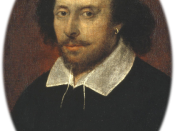I believe that William Shakespeare wrote Macbeth according to the expected outlines that a Shakespearean tragedy must have. He achieved this in all aspects of the play. Shakespeare also used some of the ideas from the Classical Greek Tragedy. Shakespeare's tragedy affected Macbeth and the people that he impacted. Shakespeare used magic, evil, mental illness and death to convey most of his ideas.
The Tragedy of Macbeth is undoubtedly one of the darkest portraits of a villain that Shakespeare could have ever written. The first sign of a Shakespearean tragedy is the fact that Macbeth is a noble man. The second characteristic of a Shakespearean tragedy in the play is when Macbeth and Banquo are met by the witches who tell a Prophesy;
"All hail, Macbeth, hail to thee, Thane of Glamis." (Witch 1)
"All hail, Macbeth, hail to thee, Thane of Cawdor." (Witch 2)
"All hail, Macbeth that shall be king here after."
(Witch 3)
Act 1 Scene 3 Line 46-49
The Prophesy and Lady Macbeth's very strong influence on Macbeth's decisions (as she seems to over power him greatly, in a type of revengeful way for her not begin able to have children.) are the causes of Macbeth's 'fatal flaw'. This occurs when he is torn between the choices to follow what is right or his wants (and Lady Macbeth's wants). In the end, his wants over power what is right and this is the start of Macbeth's bloody rise to power including the murder of the Scottish king, and the guilt-ridden pathology of evil deeds generating even more evil deeds. The result of the murder of the king makes Macbeth's position higher (affecting his heavier fall).
The Guilt of his evil deeds is shown in Macbeth's quote-
"I'll go no more. I am afraid to think what...


